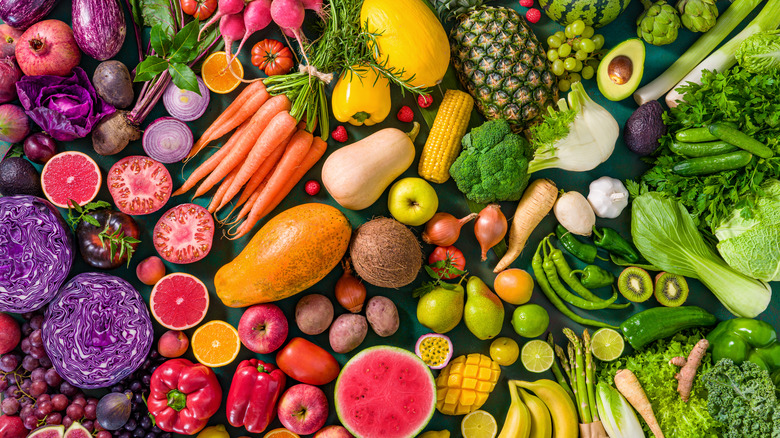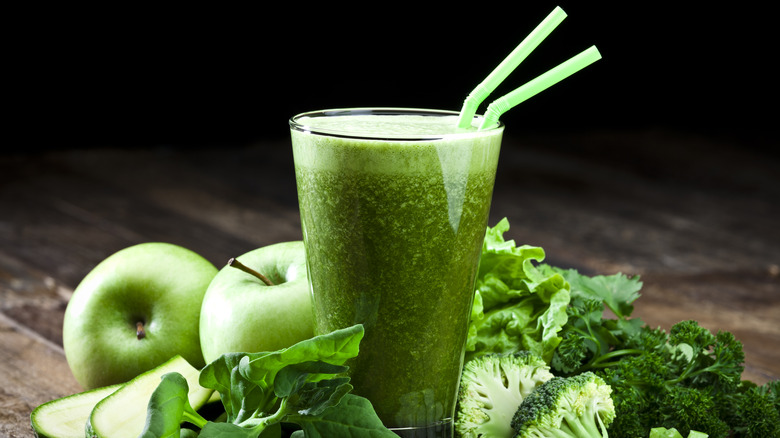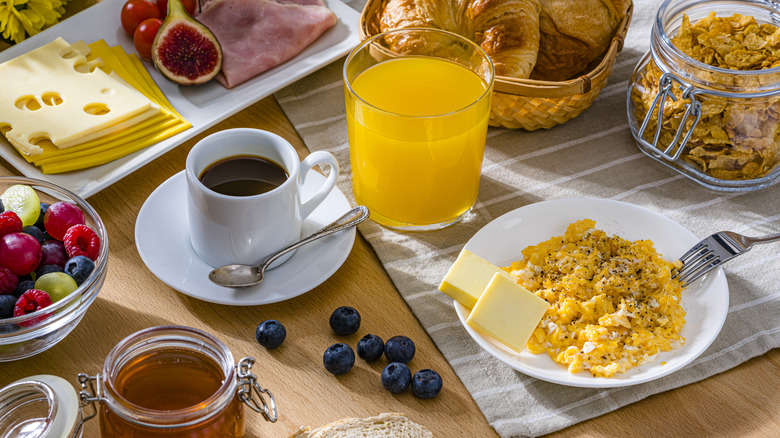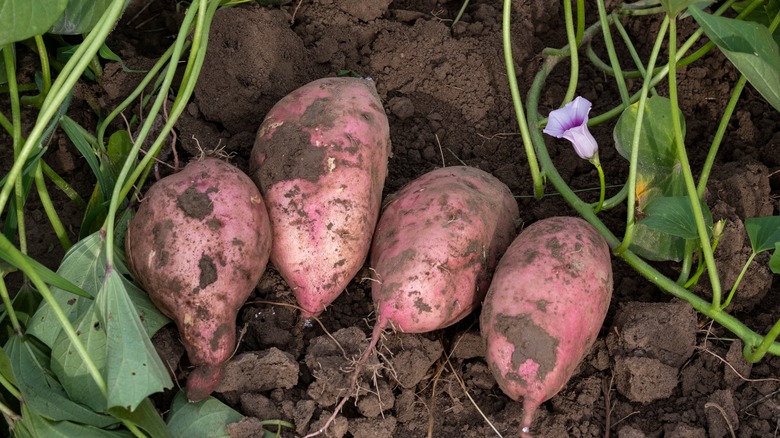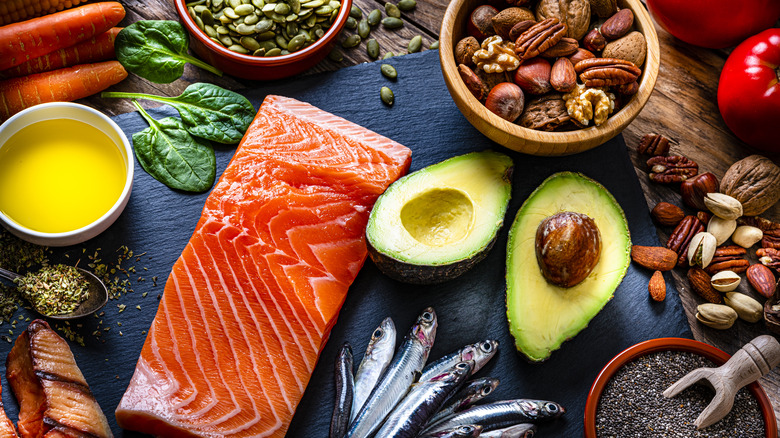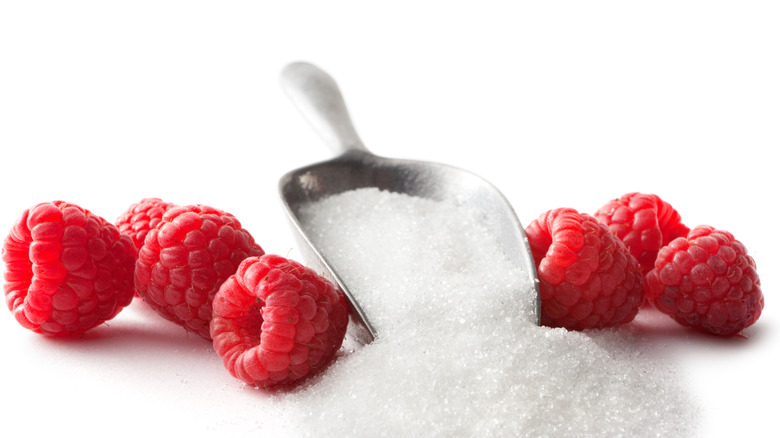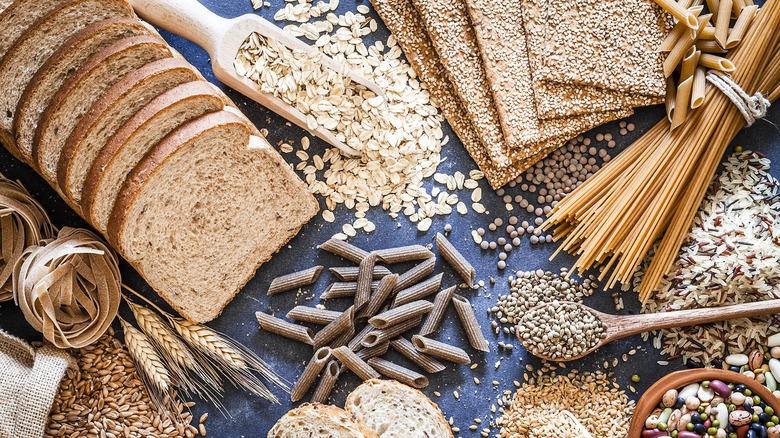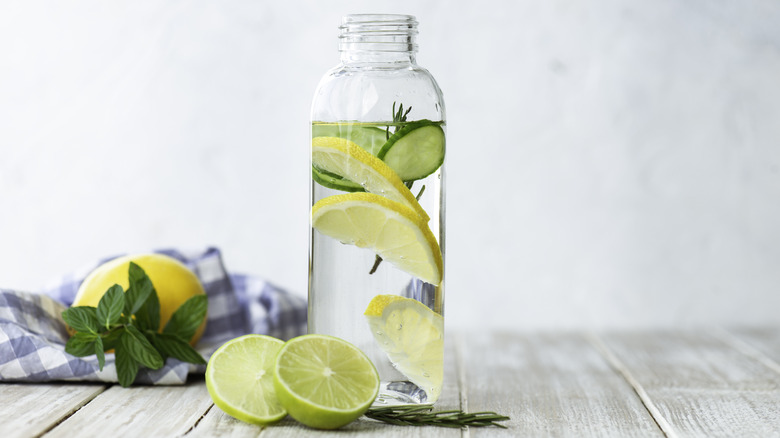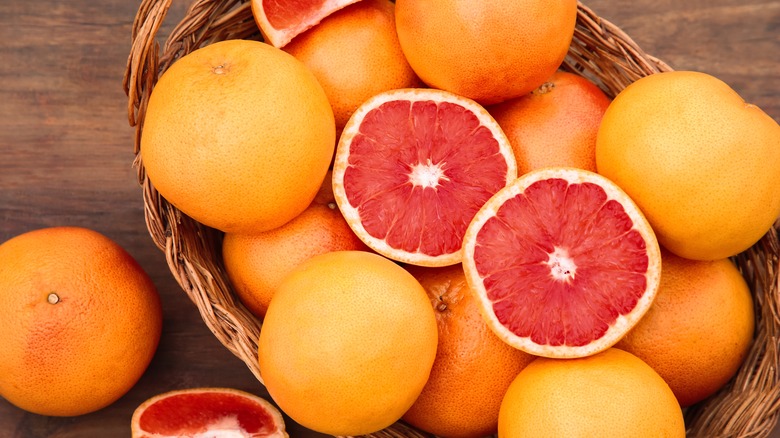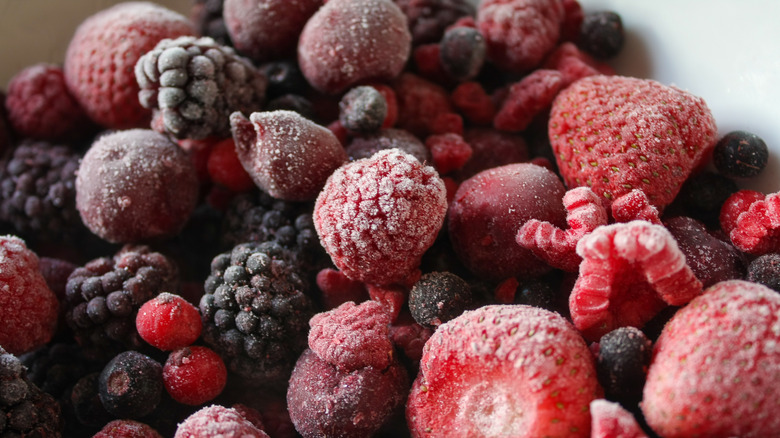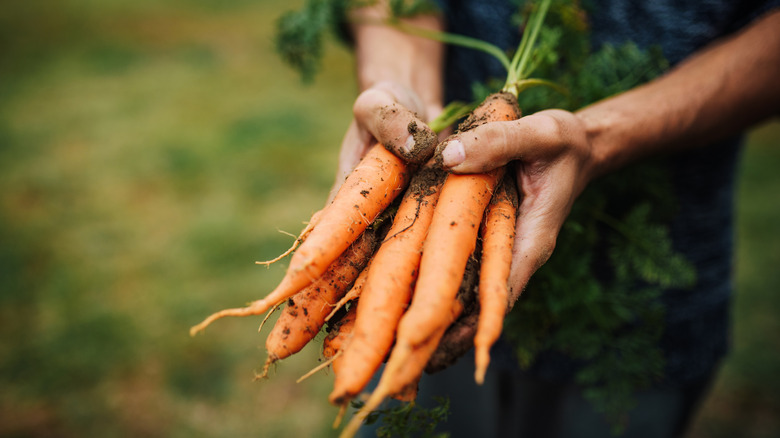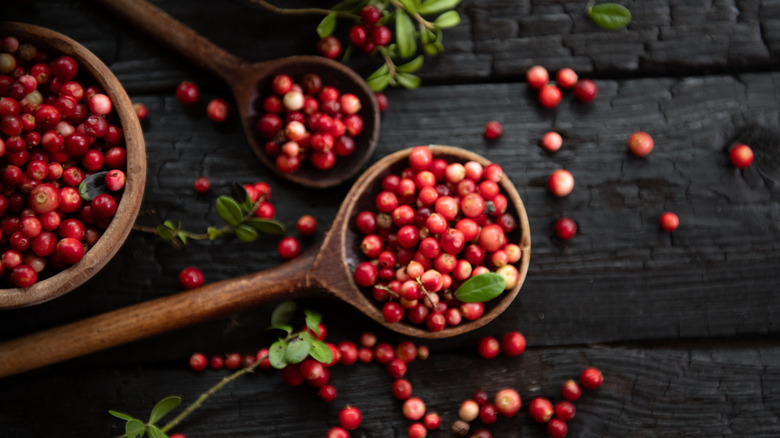12 Well-Known Food Facts That Actually Aren't True At All
Navigating the world of food can be difficult. Whether you're trying to eat healthy, sift through layers of online misinformation, follow the diet your friend swears by, or decipher nutrition labels, making smart food choices can feel downright impossible. For example, 60 years ago, everyone knew that frozen television dinners were the future, and the microwave was the best, easiest, and most convenient way to eat. Today, most of us in the know try to avoid mystery meat frozen dinners, laden with added salts, preservatives, and other not-so-great ingredients.
To make things even more complicated, the food facts we think we know — old adages, sayings, and collective knowledge — aren't always accurate. Just because something has been passed down from one person to another doesn't mean it holds water in this day and age. But knowing exactly what's true, what's false, and what's somewhere in-between can be confusing. Here, we've rounded up 12 of the most common food facts that actually aren't true at all.
1. Green juice is healthy
The girl on the subway, the influencer clogging your Instagram feed, and the guy pumping iron all have one thing in common: They're chugging green juices. Whether you see them on the local farm-to-table menu, at Starbucks, or as a grab-and-go in the supermarket cooler, green juices are everywhere — promising us our daily serving of fruits, vegetables, fiber, and good-for-us probiotics to support our biome. But green juices, at their core, aren't really that great for us. Depending on what kind you're buying, they may not be healthy at all. In fact, they could be a sugar bomb devoid of most of the fiber and nutrients from the veggies and fruits they contain.
Green juices are any juices that contain green vegetables and fruit. It could be a combination of kale, spinach, pears, parsley, and lemon; or a concoction with apples, broccoli, mint, and wheatgrass. The recipe depends entirely on where you're buying it. According to Healthline, many green juices that you'd buy in the store are pasteurized, a process which kills bacteria, but renders many of the nutrients contained in the added fruits and vegetables useless. Additionally, bottled green juices contain sugar — sometimes a great deal of it — to make these mixtures palatable. As for fiber, most of it is lost in the juice-making process. There's also the potential risk of oxalates, which can lead to kidney damage. All in all, if you want a healthier option, make your own green juice, but don't use it as a substitute for meals or eating actual fruits and vegetables.
2. Breakfast is the most important meal of the day
We've all heard it; from our moms, our teachers, our babysitters, and any feel-good family movie over the last 30 years: Breakfast is the most important meal of the day. But where did the saying start, and, more importantly, is it even true? The history of breakfast being more important than any other meal likely got its footing during the 1940s thanks to some clever marketing from cereal-maker General Mills.
Truthfully, the issue isn't whether breakfast is important. It is. The problem is the assertion that breakfast is more important than any other meal. How we begin our day — in terms of food — does impact the way we approach the rest of our day. In fact, according to the National Weight Loss Registry, 78% of people who lost weight and kept it off for at least five years ate breakfast every day. So, eating breakfast can help you make informed choices for the rest of the day. But to say it's the most important, and if you skip it your day is doomed, simply isn't true.
3. White potatoes are as healthy as sweet potatoes
A big, steaming, potato doctored up with butter, cheese, chives, sour cream, bacon, and whatever else we can dream up doesn't exactly scream "healthy." Neither does a sweet potato smothered in butter, cinnamon, and brown sugar. But, when held next to each other, at their core, most people would insist that the potatoes are equally healthy — sans toppings and additives. But the sweet potato does have a very slight edge thanks to its bright orange color.
According to the Cleveland Clinic, sweet potatoes are just a tiny bit better for you in terms of nutrition when compared to white potatoes thanks to their beta-carotene content. The antioxidant is converted into vitamin A, which helps fight off free radicals that can cause diseases like cancer. If you get your hands on some sweet spuds and want to make a run at creating some delicious dishes, avoid a common mistake with sweet potatoes and buy the freshest ones you can find. From there, you're free to give them the baked potato treatment, slice them into fries, or even mash them.
4. Fatty foods make you fat
In the 1990s, the rise of fat-free foods led to the flooding of snack shelves in grocery stores with new, improved, and "healthier" products. The idea that fat would make you fat was prevalent and seems to have stuck with us as a food myth ready to be busted. Butter and egg substitutes reigned supreme as empty carbs — like sugary breakfast cereals — were the real answer to health and weight loss.
The truth is that eating fat doesn't make you fat. According to CNN, eating foods rich in fats can actually keep you satiated for longer and help with longer-term weight loss goals. Healthy fats, like the omega-3s found in salmon, avocado, olive oil, nuts, and whole milk, are an excellent source of energy for your body. They also form the foundation for one of the most successful eating styles: the Mediterranean diet. In fact, not eating enough fat can actually cause your metabolism to slow down, so ending the night with a spoonful of almond butter or starting your morning with extra lox on that bagel isn't so bad after all.
5. Fruit sugars are better than white sugar
I remember having a conversation with an older family member who once said, "The cakes I make are healthy because I only use monk fruit sweetener." A similar conversation took place with a friend years later, who insisted she had cut out all sugar, but was in front of me eating a bowl of pineapple, plain yogurt, and unsweetened coconut. There's a common misconception that fruit sugars are better for you than refined white sugar because they're all-natural and come from fruit instead of a processing plant.
However, according to research done at Harvard, there isn't much benefit in labeling or separating naturally occurring fruit sugars from added sugars. Our bodies process sugar the same way, regardless of where it's from. Of course, the sugar occurring in fruit is far less than a Snickers bar, for example, and the benefits of eating fruit are in the antioxidants, fiber, and vitamins. So if you're craving something sweet, fruit will always be a better choice than a candy bar, but not because of the sugar myth.
6. Organic produce is better for you
When perusing the produce section at the grocery store, it's hard to ignore the clear separation (and price differential) between organic and non-organic produce. There are numerous myths about organic food, and the most important to take into account is that organic is simply a certification issued by the USDA — not a definitive marker of how ethically something is made, grown, or harvested. Additionally, the certification is expensive, making it impossible to achieve for some small family growers and farmers.
When compared to non-organic produce, organic varieties are not any more nutritious for you, but they may contain less pesticides and antibiotics. However, according to Current Developments in Nutrition, there is not a prominent risk of cancer from ingesting pesticides present on non-organic fruits and vegetables. There also exist claims that exposure to these items could be linked to Attention Deficit Hyperactivity Disorder (ADHD), but a 2022 review in the National Library of Medicine found low evidence to support that connection. Overall, if you're going to spend more money on produce, shop small and shop local.
7. Cut carbs for weight loss
Cutting out an entire group of foods in the pursuit of weight loss is never a great idea; and that includes trendy diets like Atkins, keto, and other meat-good-pasta-bad diets. According to Healthline, carbohydrates are one of three main macronutrients — the others being protein and fat — that make up all foods. Your body needs all three to keep doing its thing, so getting rid of one is really not a great idea.
Carbohydrates themselves can be split up into sugars, starches, and fibers. Some are, obviously, better than others. For example, a bowl of pasta is better than a plate of butter cookies even though both are technically carbs. The whole idea of cutting carbs came from the idea that carbohydrates, when broken down, are stored as fat if not immediately used. So, the multi-billion dollar diet industry is banking on the theory that cutting carbs means you're taking away the fat your body wants to store. However, according to a 2017 study on Gastroenterology, a low-carb diet only led to weight loss in the short term before experiencing the same long-term problem of other targeted diets: People can't stick to them. At the end of the day, eating a healthy and balanced diet is the best way to safely lose weight — not cutting out entire food groups.
8. You need to detox
Detox diets are misleading and unnecessary. If humans needed to manually detox our bodies, or otherwise rid ourselves of toxins that are either naturally occurring or we're being exposed to, we'd be dead. Your kidney and liver are already getting the job done by removing anything your body doesn't need. According to NPR, that fact hasn't stopped cleanse diets from raking in the cash from people who believe they need to deep clean their bodies the way you would a house.
After the holidays, many of us have stuffed ourselves with sugar, alcohol, fatty foods, and other not-great-for-us items. Come the new year, folks look to dieting — especially detoxing — as a way to start with a clean slate. But our bodies are already pretty good at ditching the things we don't need. Feeling sluggish, sick, or not in tip-top shape can be attributed to a poor diet and lifestyle, but cutting out everything from gluten to nightshade vegetables to caffeine to sugar to fatty foods is extremely restrictive and can be downright dangerous. As for airborne toxins, like those found in polluted environments, they're more difficult to get rid of — if at all — and no amount of fasting, juice cleanses, or dieting is going to remove them.
9. Grapefruit burns fat
One of my personal favorite fad diets of the '70s and '80s was the grapefruit diet. For the unfamiliar, the diet burst on to the scene due to a belief that grapefruits contained a fat-melting enzyme that sped up the weight loss process. So, by adding in lots of grapefruit for breakfast, lunch, and dinner, you were destined to naturally lose weight. But, according to Vanderbilt University, even though the grapefruit is full of vitamins and nutrient dense, it does not contain a secret sauce with fat-melting properties.
Instead, the grapefruit diet and subsequent fawning over the citrus fruit can be chalked up to the fact that those who start the day healthy usually tend to eat that way throughout the day. Eating grapefruit for breakfast — which is 91% water and relatively filling — can help someone feel satiated and achieve a calorie deficit. It may also help them make better choices later on for lunch and dinner. Although it's not as exciting as a miracle fruit that melts off pounds, working grapefruit into your diet is still a good idea.
10. Fresh fruit is always better than frozen
When perusing the aisles of the grocery store, it seems like a no-brainer to reach for the fresh, vibrant produce towards the front of the store. One would never, ever want to buy frozen blueberries instead of the fresh ones, right? There seems to be a clinging idea that fresh fruit is always better than the alternative, but in many cases, this simply isn't true.
According to a study via South Dakota State University, in many cases, the frozen produce is the better way to go. When fruit — like blueberries, for example — is flash frozen, it generally has been thoroughly cleaned beforehand. So the lingering pesticides, dirt, and even critters that could be on your fresh berries are scrubbed off for you. Secondly, when produce is flash frozen, it can actually make the antioxidants contained within the fruit easier to access; in some cases even intensifying them. These anthocyanins have been shown to lower the risk for heart disease and give the nervous system a helping hand. In addition to these benefits, fresh produce often is more exposed to light and air, dulling the vitamins and antioxidants present in the skin and flesh of many fruits and vegetables. Freezing preserves those healthy bits and pieces until you're ready to chow down.
11. Eat carrots for better vision
"They'll help you see in the dark!" is a phrase we've all heard from grown-ups during a dinner-time struggle over eating our carrots. But are carrots really that much better than any other fruit or vegetable in terms of helping our vision? It's complicated.
First and foremost, carrots contain quite a bit of vitamin A in the form of beta-carotene. It's what gives them (and sweet potatoes) that brilliant orange hue. According to the American Optometric Association, vitamin A is beneficial to eye health, but it doesn't work miracles. According to Smithsonian Magazine, the whole idea that carrots could help you see in the dark, and would give your eyes some sort of supernatural boost, started in Britain during World War II. Citywide blackouts had been issued so as to prevent German bombers from finding their targets. One British night fighter, who was responsible for taking out numerous enemy planes, said his incredible eyesight was due to eating lots of carrots. This may have been a little true, but the claim was mostly propagated to keep the enemy off the scent of the new radar system the pilot was using. The British war offices also pushed the carrot propaganda as a way to encourage families to plant gardens and grow their own food instead of waiting in ration lines.
So, even though carrots are inherently good for us, the vision myth came from a wartime necessity than anything else. Sweet potatoes and other veggies with high amounts of vitamin A are just as good for your eyes as carrots.
12. Cranberry juice will cure your UTI
It's long been believed that chugging a few bottles of cranberry juice can cure a painful urinary tract infection, or UTI. The bacterial infection, which is fairly common in women, is usually treated with antibiotics. But the natural route is a popular one, and the idea that cranberry juice could help is the myth that just won't die.
According to Healthline, the idea that cranberries, cranberry juice, and cranberry supplements can help a urinary tract infection comes from the fact that cranberries contain phenolic acids and flavonoids, which are believed to help reduce inflammation, help stop bacteria from sticking to the walls of the urinary tract, and decrease the amount of bacteria present in the bladder. So, if anything, cranberry juice and supplements may be better at preventing a UTI rather than curing one. As a note, cranberry juice means 100% cranberry juice, not the OceanSpray cranberry juice cocktail, which contains about 10% juice and a lot of sugar. If you have an active UTI, PennMedicine says you'll need to see a doctor; where you'll most likely be prescribed an antibiotic.
